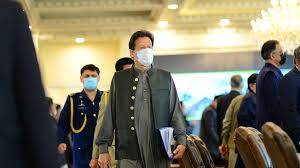It is no secret that Imran Khan awaited his turn to be the country’s premier for a long, long time. To his dismay, though, he was handed a proportionately long and varied list of domestic and international issues – almost as if Fate was challenging him to prove his worth. It was time to walk the talk.
From Tehreek-e-Labbaik’s rise, to the medical and economic challenges posed by COVID-19, to the nosediving economy and IMF’s cold shoulders – Imran Khan’s three years in office have been frightfully eventful. As if that was not enough, the US also decided to depart from an unstable Afghanistan after spending two decades in charge, leaving the field open for the patiently waiting Taliban – smack in the middle of his tenure. Leaving Khan and his government to make haste and form diplomatic relationships with a force that has historically mystified even the best of diplomatic codebreakers – a regime whose decisions and actions nobody could foretell with surety. Except, perhaps, for our man in the PM’s office, himself.
Luckily for the cricketer-turned-politician, experience was on his side: Khan has always enjoyed a reputation for having a soft spot for the Taliban – be they Afghan or Pakistani – and the Taliban have also returned the favour in the past. He was – notoriously – the only man in Pakistani politics to support talks with the Pakistani wing of the Taliban – the Tehreek-e-Taliban Pakistan or TTP – even as the Islamic hardliners attacked the Army Public School. So, thank Fate, Khan got what he wished for.
After the Afghan Taliban recently took Kabul, Pakistan saw a proportionate rise in attacks especially in its northwestern, tribal regions, along the Durand Line. The resurgence of the Afghan Taliban in Afghanistan had seen a rise in the violence conducted by their ‘ideological twins’ here in Pakistan, having undertaken over a hundred attacks in the past year and a half, according to a BBC report.
To quell the unrest in the country’s northwestern, largely Pashtun tribal belt, Khan and his government opted for the same strategy that it used with the militant far-right in the mainland of the country: negotiations.
Much like the dealings with the Tehreek-e-Labbaik Pakistan, the talks with the TTP were not smooth – they took weeks, just as they took months with their ‘counterparts’ in Punjab. However, a deal was finally arrived at through which the TTP agreed to a month-long ceasefire, starting on November 9, in return for the release of a 100 TTP personnel. Despite facing much skepticism – most believed that the TTP would not hold up its end of the negotiations – a month later, it can be observed that the violence in Pakistan’s tribal belt has significantly reduced, indicating that the militant outfit has adhered to the terms it agreed upon with the Pakistani government.
However, talks with the TTP have not come without a cost: Khan was recently grilled by the Pakistani Supreme Court for negotiating with the instigators of the 2014 Peshawar school massacre, without taking the kin of the 150 people who lost their lives, on board. One such man, Dost Muhammad, who lost his 14-year-old son in the attack, says, “The government did not take us into confidence over the negotiations with the murderers of our children. They have no right to decide alone and talk to the TTP. They should have consulted us before engaging with them.”
Sindh Assembly reiterated the same opinion, dismissing the negotiations as ‘unilateral’.
Neither Dost Muhammad nor Sindh’s Provincial Assembly are wrong in expecting the state to take them into confidence before initiating such an important step.
However, it also cannot be denied that the ceasefire has benefited the Pakistani state, with reports being received of the government using this time to divert its attention to productive ventures, such as armor modernization.






